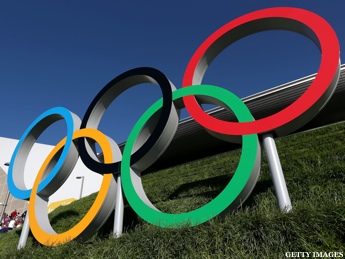In the wake of anti-gay legislation signed by Russian president Vladimir Putin, the International Olympic Committee (IOC) has assured fans and athletes that those traveling to Russia for the 2014 Sochi Olympics will not be affected by the new laws. But protests against them are gaining steam.
In June, Putin signed a bill imposing jail terms and fines for people who participate in the "propaganda of nontraditional sexual relations." The vague law outlaws public events that promote gay rights and makes it criminal for individuals to promote "homosexual behavior among minors." A separate law allows police to arrest tourists and foreign nationals suspected of being homosexual, lesbian or simply pro-gay.
Actor and playwright Harvey Fierstein blasted the new legislation in a New York Times op-ed:

"The law is broad and vague, so that any teacher who tells students that homosexuality is not evil, any parents who tell their child that homosexuality is normal, or anyone who makes pro-gay statements deemed accessible to someone underage is now subject to arrest and fines."
Foreigners are not exempt from the anti-gay "propaganda" law, and according to reports they could face administrative arrest and even deportation for engaging in the outlawed activities.
With the Sochi Olympics set to begin in February, athletes, supporters and activists have expressed outrage and fear over the country's restrictive new law. In a statement this week, the IOC set out to reassure those who plan on attending the games:
"The IOC has received assurances from the highest level of government in Russia that the legislation will not affect those attending or taking part in the Games," the organization wrote.
"This legislation has just been passed into law and it remains to be seen whether and how it will be implemented, particularly as regards the Games in Sochi," the statement continued. "As a sporting organization, what we can do is to continue to work to ensure that the Games can take place without discrimination against athletes, officials, spectators and the media."
Anger over Russia's new policy has led to boycotts of Russian products in the United States. Certain bars across the country have banned Russian vodka, while activist Dan Savage, Fierstein and others have brought up the idea of a boycott of the games.

Prominent sporting figures, including openly gay figure skater Johnny Weir and Cyd Zeigler, president of Outsports, have argued against a potential boycott.
“No Olympic boycott has ever accomplished anything. The 1980 boycott of the Soviet games was to protest the invasion of Afghanistan. They did not leave for nine more years,” Zeigler told The Miami Herald. “It’s just targeting the wrong people. You’re not hurting the Russian government. You’re hurting the 18- and 19-year-old athletes who've worked for years to get to this point."
In a letter to NBCUniversal, which has the exclusive rights to the Olympic Games, the Human Rights Campaign urged the network to expose the "inhumane and unjust law” during its broadcasts:
"NBCUniversal, which has the exclusive rights to broadcast the Olympics in the United States, has a unique opportunity -- and a responsibility -- to expose this inhumane and unjust law to millions of American viewers who will tune in to watch the Games," the letter read.
(Update: NBC Sports head Mark Lazarus told reporters at the Television Critics Association summer press tour Saturday, "If it is still their law and impacting any part of the Olympic games we will acknowledge it. We as a company obviously believe in equality and opportunity for all. We don't believe the Games are in the spirit of the law that they have passed and we're hopeful the Olympic spirit will win out.")
The "propaganda" law isn't the only piece of anti-gay legislation signed by Putin in recent weeks. Earlier this month Putin supported a bill which prohibits adoption by same-sex foreign couples whose native country recognizes their union as marriage as well as by single people or unmarried couples from those nations.




